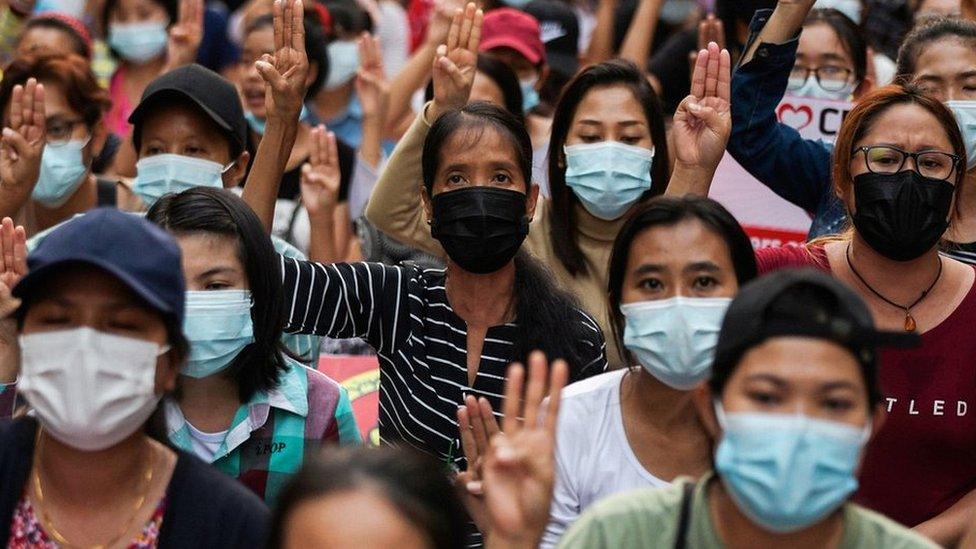Myanmar coup: 'Everything will be OK' teenage protester mourned
- Published
Hundreds attend funeral for teenager killed in Myanmar protests
Crowds gathered in Mandalay on Thursday for the funeral of a 19-year-old woman who was shot dead during Myanmar's anti-coup protests a day earlier.
Kyal Sin, known as Angel, was wearing a T-shirt with the phrase "Everything will be OK" when she died.
Tributes have flooded in on social media, with many calling her a hero.
Since the 1 February coup, Myanmar has been gripped by mass protests demanding an end to military rule and the release of detained elected leaders.
More than 54 people have been killed by security forces in the protests so far, according to the UN Human Rights Office, although other reports put the figure much higher. Wednesday was the bloodiest day since the coup, with 38 protesters killed in cities and towns across the country.
UN High Commissioner for Human Rights Michelle Bachelet called on security forces to "halt their vicious crackdown on peaceful protesters".
Dozens of countries have now condemned the violence in Myanmar, though this has been largely ignored by the coup leaders.
And Myanmar's ambassador to the UN, who the military said they had fired after he pleaded for help to restore democracy, called for "the strongest international actions" against the military.
"You see these last 3-4 days how many of our innocent and young lives have been taken away," Kyaw Moe Tun told the BBC World Service's Newshour programme in his first interview since he was replaced. "What we want for the people of Myanmar is protection."
Meanwhile his deputy Tin Maung Naing, who the military appointed in his place, said he had resigned and that Kyaw Moe Tun was still ambassador.
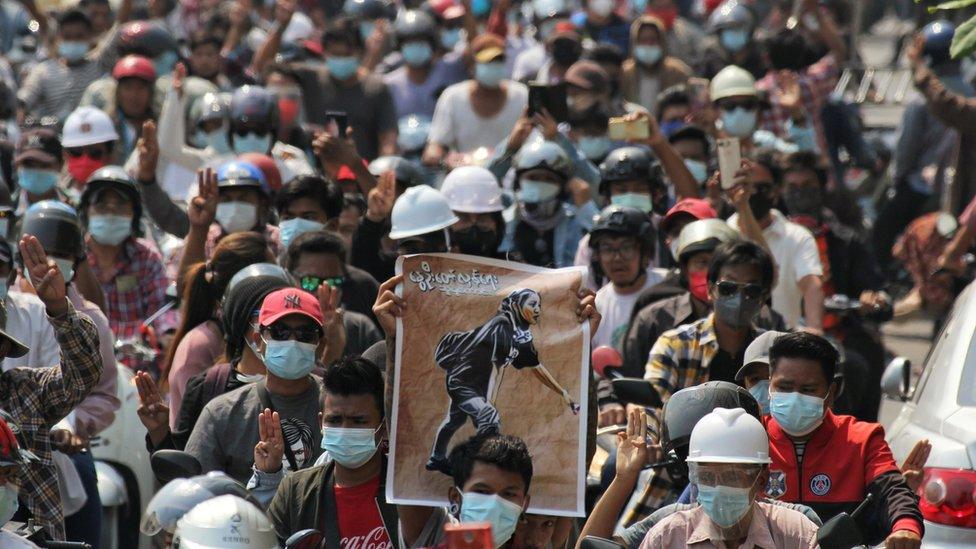
Angel was shot dead on Wednesday while attending an anti-coup protest in Mandalay
What happened to Angel?
On Thursday in Mandalay, people lined the route of Angel's funeral procession.
Mourners sang revolutionary songs and chanted anti-coup slogans, Reuters news agency reports.
Images of the teenager wearing her "Everything will be OK" T-shirt at the protests had gone viral.
Aware of the dangers of taking part in the protests, she had written her blood type details on Facebook and requested that her organs be donated in the event of her death.
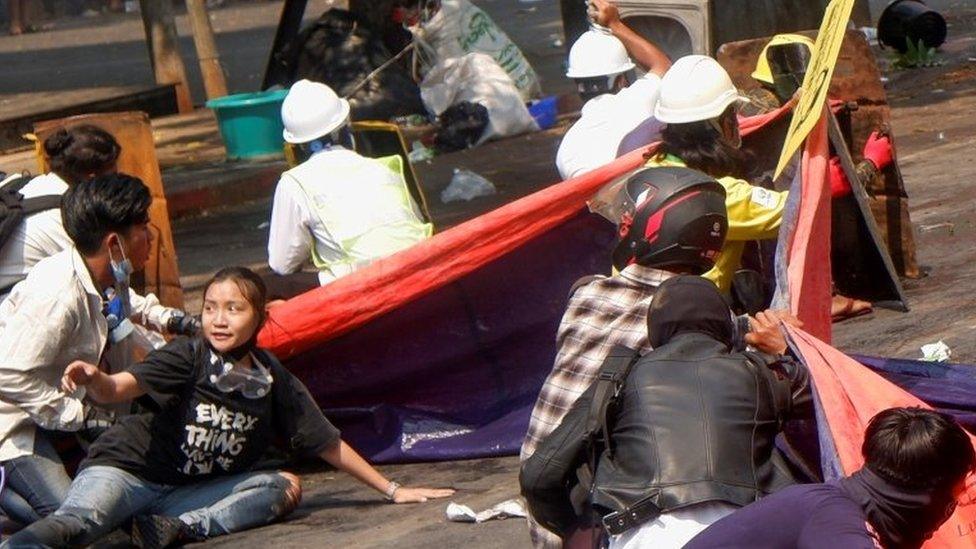
Images of Angel wearing a T-shirt with the slogan 'Everything will be OK' went viral online
Myat Thu, who was with her at the protest on Wednesday, said she had kicked open a water pipe so protesters could wash tear gas from their eyes. She had also tried to help him as police opened fire.
"She told me 'Sit! Bullets will hit you'," he told Reuters. "She cared for and protected others."
He said police hit them with tear gas and then the bullets came.
Myat Thu said Angel, who had proudly voted in elections for the first time last year, was a "happy girl".
"She loved her family and her family loved her so much too," he said. "We are not in a war. There is no reason to use live bullets on people."
People also paid tribute to Angel on social media. One friend wrote on Facebook: "My heart feels so my hurt."
Another said: "Rest in peace my friend. We will fight this revolution to the end."
Allow X content?
This article contains content provided by X. We ask for your permission before anything is loaded, as they may be using cookies and other technologies. You may want to read X’s cookie policy, external and privacy policy, external before accepting. To view this content choose ‘accept and continue’.


Defiant protesters are united
Moe Myint, BBC Burmese
In a video which showed Kyal Sin's last minutes, she was seen leading a group of young protesters. When tear gas rained down and shooting came from security forces at the other end of the road, all of them looked worried but she shouted: "Are we united?", and they chanted "United, United". A family friend later said she was a truly inspirational leader.
Kyal Sin is one of several teenagers who gave up their lives on Wednesday. Gen Z, as they are called, believe their future must not be shaped by a military regime. But the same old army again committed atrocities even in urban areas where people film on their mobile phones.
One protester told me that he had never seen this kind of inhumane cruelty by police and soldiers who are shooting unarmed protesters with live ammunition, many of them in the head. But he insisted they would not be silenced and the military's barbaric acts made him even more determined.
At Kyal Sin's funeral, her aunt also vowed: "I feel sad but they must fall soon. Our fight must win."

What is the latest on the protests?
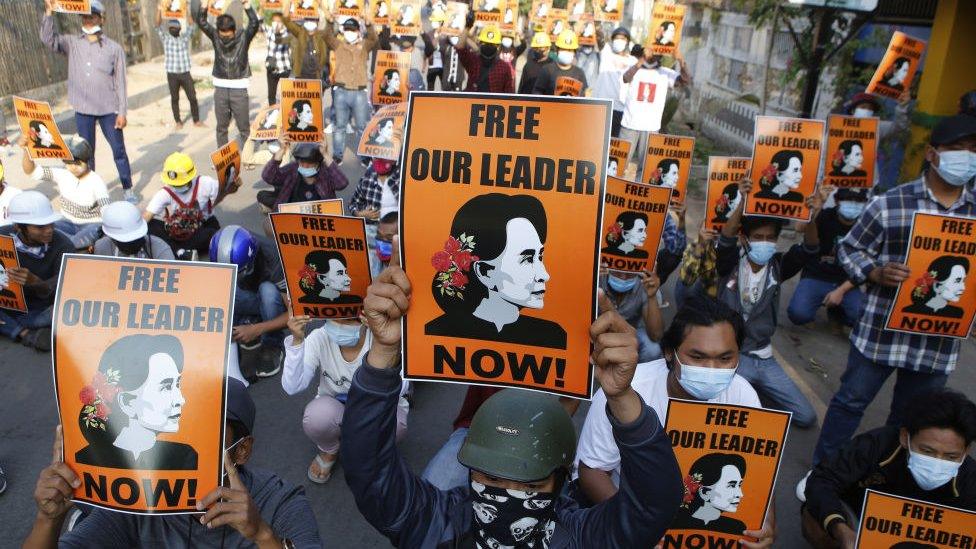
Protesters demand the release of detained leader Aung San Suu Kyi
Undeterred by Wednesday's deaths, protesters made their way out on to the streets of Yangon and Mandalay - the country's two biggest cities - as well as those of other cities and towns.
According to news site Myanmar Now, tens of thousands of people were protesting in the town of Myingyan, where a demonstrator had been shot dead the day before.
Reuters news agency says police opened fire and used tear gas to break up protesters in Yangon and the town of Monywa.
Residents said that five fighter jets had made low passes in formation over Mandalay early on Thursday, in what appeared to be a show of military strength.
More than 1,700 people, including members of parliament and protesters, have been detained since the coup, Ms Bachelet said in a statement. Arrests have been escalating with 29 journalists detained in recent days, she said.
She warned the figures could be much higher due to the large scale of the protests and difficulty in monitoring developments.
On Wednesday, police and soldiers reportedly opened fire with live rounds in several cities and towns with little warning.
Protesters said they used rubber bullets but also live rounds.
Video footage shows anti-coup protesters running to avoid police tear gas
UN envoy to Myanmar, Christine Schraner Burgener, said one video clip showed police beating an unarmed volunteer medic.
Why are people protesting?
Myanmar's military seized power after overthrowing the government of including Aung San Suu Kyi and declared a state of emergency.
Just days later, the civil disobedience movement began to emerge, with many people refusing to return to work.
The movement quickly started to gain momentum and it was not long before hundreds of thousands of people began taking part in street protests.
A violent crackdown began on the largely peaceful protests last weekend.
The military has not commented on the deaths.

Myanmar in profile
Myanmar, also known as Burma, became independent from Britain in 1948. For much of its modern history it has been under military rule
Restrictions began loosening from 2010 onwards, leading to free elections in 2015 and the installation of a government led by veteran opposition leader Aung San Suu Kyi the following year
In 2017, Myanmar's army responded to attacks on police by Rohingya militants with a deadly crackdown, driving more than half a million Rohingya Muslims across the border into Bangladesh in what the UN later called a "textbook example of ethnic cleansing"
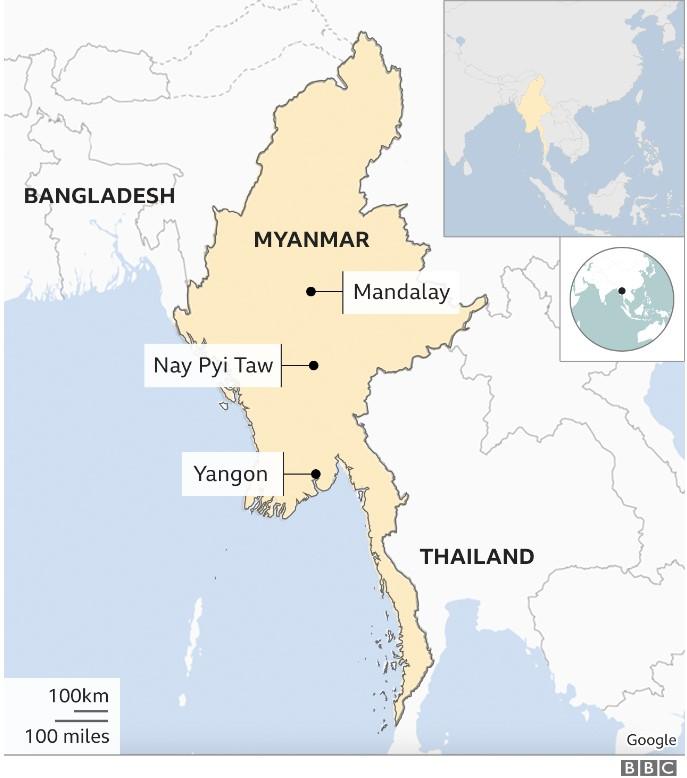

Related topics
- Published3 March 2021
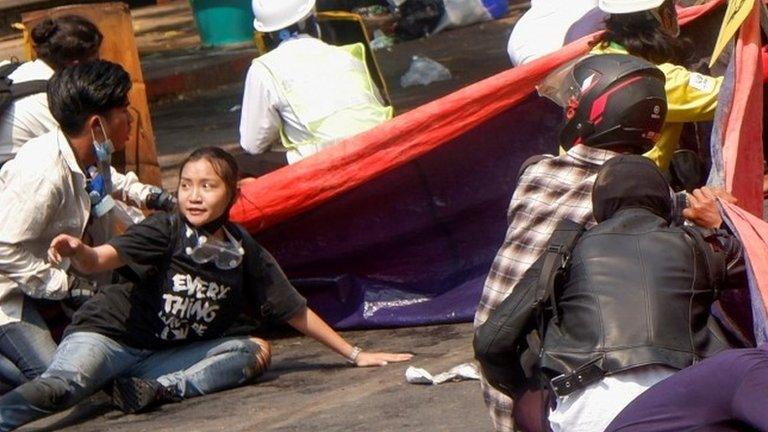
- Published1 March 2021
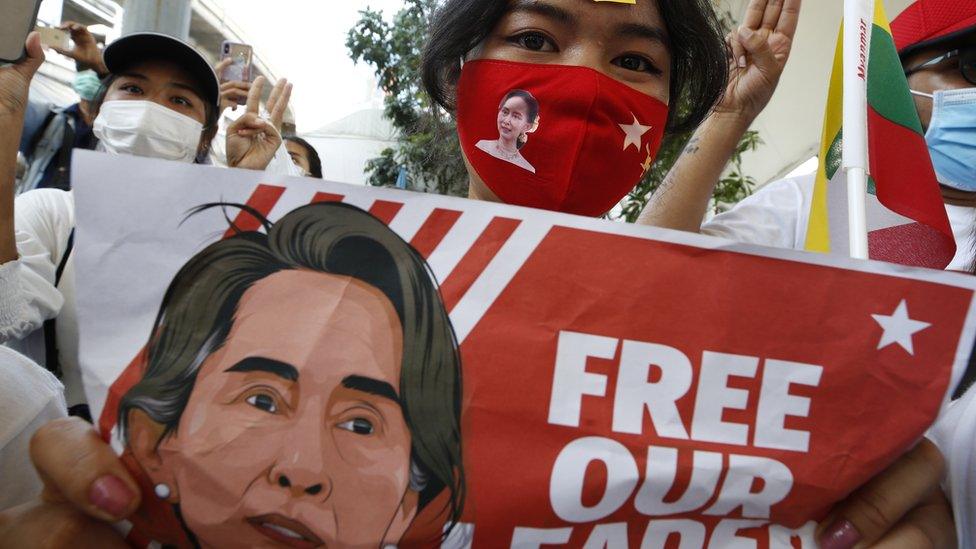
- Published25 July 2022
